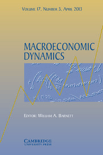
MACROECONOMIC DYNAMICS
Scope & Guideline
Connecting Theory and Empirical Analysis in Economics
Introduction
Aims and Scopes
- Macroeconomic Theory and Models:
The journal publishes work that develops and critiques macroeconomic models, including those that incorporate aspects like behavioral economics, monetary policy, and fiscal dynamics. This includes both traditional DSGE models and new approaches that address complex economic interactions. - Empirical Analysis of Economic Dynamics:
A strong focus on empirical studies that utilize data to analyze macroeconomic trends, policy impacts, and economic fluctuations. This includes quantitative analyses using advanced econometric techniques. - Interdisciplinary Approaches:
Research that integrates insights from different fields such as finance, sociology, and political economy to better understand macroeconomic dynamics. This includes studies on the effects of demographics, technology, and policy on economic performance. - Policy Implications and Recommendations:
Many papers address the implications of research findings for economic policy, providing insights on how various fiscal and monetary policies can influence macroeconomic stability and growth. - Global Economic Interactions:
The journal explores the interconnectedness of global economies, including the impact of international trade, capital flows, and global financial markets on domestic economic conditions.
Trending and Emerging
- Behavioral Economics and Expectations:
There is a growing emphasis on behavioral aspects of economic decision-making, including how expectations shape consumer behavior and market dynamics. This trend reflects a broader recognition of the limitations of traditional rational agent models. - Digital Currencies and Monetary Policy:
The exploration of central bank digital currencies (CBDCs) and their implications for monetary policy is gaining traction, reflecting the increasing relevance of digital finance and its potential to transform economic systems. - Inequality and Economic Resilience:
Research examining the interactions between economic inequality and macroeconomic stability is on the rise. This reflects a growing awareness of how disparities in wealth and income can affect overall economic performance. - Environmental Economics and Sustainability:
There is a notable increase in papers addressing the economic implications of environmental policies and sustainability, especially in the context of climate change and resource allocation. - Technological Change and Automation:
Studies focusing on the impact of technological advancements and automation on labor markets and economic growth are becoming more prominent, highlighting the challenges and opportunities presented by rapid technological change.
Declining or Waning
- Traditional Macroeconomic Indicators:
There has been a noticeable decline in research centered around traditional macroeconomic indicators like GDP growth alone, as newer studies tend to focus on more nuanced measures of economic performance, including well-being and inequality. - Linear Models of Economic Dynamics:
Research relying heavily on linear models and assumptions is becoming less frequent, as there is a growing preference for non-linear models that better capture the complexities of real-world economic behavior. - Static Analysis of Fiscal Policy:
Studies that provide static analysis of fiscal policies without considering dynamic interactions over time are appearing less often, as researchers increasingly emphasize the importance of time-varying and adaptive policy frameworks. - Simplistic Views on Monetary Policy:
Papers that offer overly simplistic views on monetary policy, such as those that do not account for the effects of expectations or behavioral responses, are becoming less common as the discourse shifts to more comprehensive frameworks. - Focus on Isolated Economies:
There is a decrease in research that studies economies in isolation without considering global influences, as the interconnected nature of economies is increasingly recognized.
Similar Journals

INTERNATIONAL ECONOMICS AND ECONOMIC POLICY
Connecting Theory and Practice in International EconomicsINTERNATIONAL ECONOMICS AND ECONOMIC POLICY, published by Springer Heidelberg, is a pivotal journal in the field of economics, focusing on both theoretical and empirical research that addresses pressing international economic issues. With an ISSN of 1612-4804 and an E-ISSN of 1612-4812, this journal has been a reliable source of insights since its inception and is poised for continuous growth, converging its themes from 2005 to 2024. Ranked in the Q2 category of Economics and Econometrics in 2023, it stands at a commendable 63rd percentile among similar journals, emphasizing its significance and impact in the academic community. Located in Heidelberg, Germany, the journal provides an access portal for researchers, professionals, and students to engage with cutting-edge economic analyses that inform policy and practice globally. By publishing original articles, reviews, and policy discussions, INTERNATIONAL ECONOMICS AND ECONOMIC POLICY plays a crucial role in shaping the discourse within the global economics landscape.
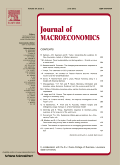
JOURNAL OF MACROECONOMICS
Advancing Insights in Macroeconomic ResearchJOURNAL OF MACROECONOMICS, published by Elsevier, stands as a significant platform for scholarly discourse in the field of economics and econometrics. With an ISSN of 0164-0704 and an E-ISSN of 1873-152X, this journal has been actively contributing to the academic community since 1979 and continues to publish impactful research through 2024. It is recognized within the Q2 category for Economics and Econometrics in its 2023 quartile rankings, and it holds a respectable Scopus ranking of #353 out of 716 in its field, placing it in the 50th percentile. Despite not being an open-access journal, it provides valuable insights into macroeconomic theories, empirical assessments, and policy implications, making it an essential resource for researchers, professionals, and students aiming to deepen their understanding of macroeconomic dynamics. To access a breadth of contemporary research and enhance your academic pursuits, consider diving into the latest issues of this esteemed journal, conveniently located in Amsterdam, Netherlands, at RADARWEG 29, 1043 NX.
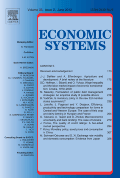
Economic Systems
Elevating research standards in economic systems.Economic Systems is a premier academic journal published by Elsevier, specializing in the dynamic field of economics and econometrics. With an ISSN of 0939-3625 and E-ISSN 1878-5433, this journal is known for its rigorous peer-reviewed articles that delve into economic theory, policy analysis, and empirical research, making it an invaluable resource for researchers, professionals, and students alike. Based in the Netherlands, the journal has established a strong reputation, evidenced by its Q2 ranking in Economics and Econometrics and a commendable position within the 74th percentile of its category in Scopus rankings. Covering a breadth of topics relevant to contemporary economic systems, from their structural assessments to real-world applications, Economic Systems aims to inform and advance the discourse within the field. While it operates under a subscription model, the journal ensures accessibility to groundbreaking research, encouraging a deeper understanding of the economic challenges facing today’s societies.
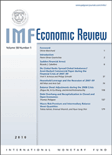
IMF Economic Review
Pioneering Research that Challenges Conventional Economic ParadigmsIMF Economic Review, published by Palgrave Macmillan Ltd, stands as a preeminent journal in the fields of Economics and Business Management, holding a prestigious Q1 ranking in both categories as of 2023. With an ISSN of 2041-4161 and an E-ISSN of 2041-417X, this journal not only showcases high-quality, peer-reviewed research but also embraces the principles of Open Access, promoting wide dissemination of its findings to researchers, professionals, and students alike. Spanning significant years from 2010 to 2024, the IMF Economic Review features innovative analyses and insights that challenge conventional economic paradigms and foster deeper understanding of global economic dynamics. Its impressive Scopus ranking places it in the top 10% of economics journals globally, affirming its vital role in advancing academic discourse and practical application in economics and finance. For those dedicated to exploring the intricacies of economic theory and practice, the IMF Economic Review is an invaluable resource that not only informs but also inspires.
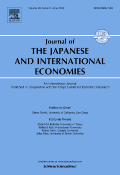
JOURNAL OF THE JAPANESE AND INTERNATIONAL ECONOMIES
Illuminating the Interplay of Local and Global EconomiesJOURNAL OF THE JAPANESE AND INTERNATIONAL ECONOMIES, a prestigious publication from Academic Press Inc. Elsevier Science, has been a vital contributor to the fields of economics, finance, and political science since its inception in 1987. With an impressive impact factor and recognized within the Q2 category for Economics and Econometrics as well as Finance, and Q1 for Political Science and International Relations, this journal serves as a critical platform for peer-reviewed research that influences both academic discourse and policy-making. The journal is indexed in Scopus, evidencing its prominent position within the scholarly community, with notable rankings of #56 in Political Science and #72 in Finance. Authors and researchers are encouraged to submit their work, contributing to the rich tapestry of knowledge surrounding the economic dynamics of Japan and the broader international landscape. Though it does not offer open access, the journal's subscription model ensures a wide dissemination of its impactful articles, making it essential reading for those aimed at deepening their understanding of economic interrelations and current global issues.
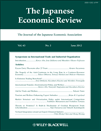
JAPANESE ECONOMIC REVIEW
Fostering scholarly dialogue on Asia-Pacific economic processes.Japanese Economic Review, published by Springer Heidelberg, is a renowned academic journal that aims to advance the understanding of economic processes within the context of Japan and the Asia-Pacific region. With an ISSN of 1352-4739 and E-ISSN of 1468-5876, this journal features high-quality research articles that span a broad range of topics in economics and econometrics. Ranked in the Q2 category for Economics and Econometrics as of 2023, it holds a Scopus rank of #332 out of 716, placing it in the 53rd percentile among its peers. Although not Open Access, the journal invites contributions that provide insights and empirical analyses beneficial to both academics and practitioners. Emphasizing a deep understanding of economic dynamics, the Japanese Economic Review is essential reading for anyone interested in the implications of economic policies and trends, making it a significant platform for scholarly dialogue and research dissemination.

OPEN ECONOMIES REVIEW
Connecting Scholars to Economic Innovations.OPEN ECONOMIES REVIEW is a distinguished journal, published by SPRINGER in the field of economics and econometrics, dedicated to exploring the complexities of global economic interactions and policy implications. With its ISSN 0923-7992 and E-ISSN 1573-708X, this journal serves as a vital platform for scholars and practitioners alike, offering insights that bridge theoretical and empirical research. Established in 1990, it is set to continue its impactful journey through 2024, showcasing research that is ranked in the top quartile (Q2) of its category for 2023 and positioned in the 46th percentile overall among economic journals. Although not an open-access journal, it ensures comprehensive accessibility to cutting-edge findings and methodologies in economics, contributing to informed decision-making and policy development. Situated in the Netherlands at VAN GODEWIJCKSTRAAT 30, 3311 GZ DORDRECHT, this publication is essential for researchers, professionals, and students seeking to navigate the dynamic landscape of global economies.

AUSTRALIAN ECONOMIC PAPERS
Empowering economists with cutting-edge research and analysis.Australian Economic Papers is a leading scholarly journal dedicated to advancing the field of economics, published by Wiley in the United Kingdom. With a robust legacy dating back to its inception in 1962, this journal has earned a reputable position in the academic community, reflected in its Q2 classification in the Economics, Econometrics and Finance category for 2023, and its rank of #76/288 in the Scopus database, placing it within the 73rd percentile. Australian Economic Papers seeks to publish rigorous research that addresses a diverse range of topics within economics, fostering a deep understanding of contemporary economic issues. It serves as an essential resource for researchers, professionals, and students aiming to explore innovative economic theories and empirical studies. While currently not available as an Open Access journal, its contributions are invaluable for those seeking to enrich their knowledge and engage with cutting-edge research in the dynamic field of economics.
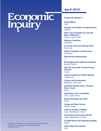
ECONOMIC INQUIRY
Innovating Perspectives on Economic Phenomena.ECONOMIC INQUIRY, published by Wiley, is a prestigious academic journal that has been at the forefront of research in economics and management since its inception in 1962. With an ISSN of 0095-2583 and an E-ISSN of 1465-7295, this journal is renowned for its rigorous peer-reviewed articles, embracing a wide scope of economic and econometric inquiries. Its impressive placement in the Q1 category for both Business, Management and Accounting, and Economics and Econometrics highlights its significance within these fields. With a Scopus rank placing it in the top quartile of Economics and Econometrics journals, alongside a ranking for Business studies, it caters to a diverse audience of researchers, professionals, and students eager to deepen their understanding of economic phenomena. Although it operates under a traditional subscription model and does not offer open access, the journal's contributions are instrumental in advancing knowledge and discourse in economic theory and practice, making it an essential resource for anyone involved in this vibrant discipline.
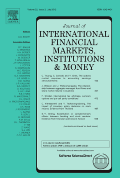
Journal of International Financial Markets Institutions & Money
Shaping the Future of Financial Markets and InstitutionsThe Journal of International Financial Markets, Institutions & Money, published by Elsevier, serves as a leading platform for the dissemination of high-quality research in the fields of finance, economics, and econometrics. With an impressive impact factor reflected in its status as a Q1 journal in both categories for 2023, it ranks among the top journals, positioned at #47 out of 317 in Finance and #111 out of 716 in Economics. This journal offers a unique focus on the interplay between financial markets and institutions on a global scale, making it an essential resource for scholars, practitioners, and students alike. The journal welcomes innovative theoretical, empirical, and applied research, contributing to an exciting dialogue that shapes the future of international finance. For researchers looking to publish their findings, this journal is committed to rigorously engaging with contemporary financial phenomena, positioning itself as a vital cornerstone of academic and professional discourse.